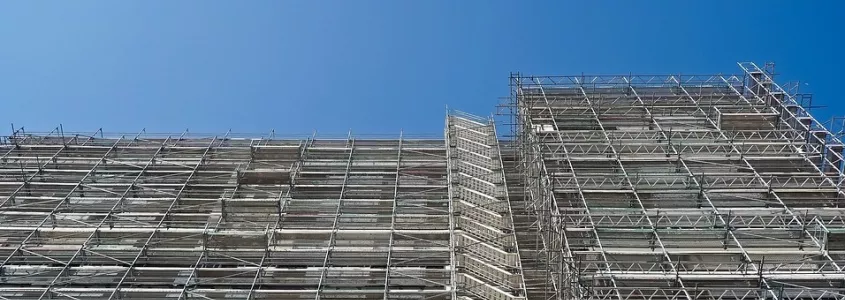
Table of contents
Spanish Building Law
The Ley de Ordenación de la Edificación en España, better known by the abbreviation LOE Edificación, is a text that regulates and determines the basic requirements to be able to build within the national territory. It has been in force since 1999, but has undergone several modifications over the last few years.
Our aim in this article is to explain to you, as simply and clearly as possible, all the basic requirements for building that this building law contemplates in Spain. Let's get down to it.
What is the scope of application of the LOE?
The LOE basically affects the entire building process, i.e. the process by which a building is constructed, whether public or private, of a permanent nature. In this sense, it is possible to distinguish between:
New construction works. These are those that are carried out from scratch on a plot of land, with the exception of those that are neither public nor residential in nature and only have a single floor.
Total intervention works. These are carried out on listed buildings or, failing that, on buildings that have any kind of protection due to their artistic, historical or environmental value. In these cases, it is necessary to comply with certain special rules.
Works of modification, reform, extension or refurbishment of buildings. Only those that, in some way, affect the configuration of the building from an architectural point of view are covered by the law. To do so, they must affect its volumetry, the composition of the exterior or the structure as a whole.
In addition, the law provides for 8 building agents who must be responsible for ensuring compliance with the basic requirements defined below. These are the developer, the designer, the builder, the project manager, the project execution manager, the quality control entity, the product supplier and the owners and users of the building.
What are the basic requirements for building?
The LOE establishes a series of basic requirements for anyone wishing to build a building in Spain that guarantees the protection of the environment, the well-being of people and safety. These must be specified and carried out in the preparation of the project, in the construction phase, in the maintenance and conservation work for the correct use of the installations.
Within this section, a classification must be made according to the area they affect.
1. Basic requirements relating to functionality
The size, provision and layout of the facilities must facilitate the functions for which the building has been designed. In addition, it must be fully accessible to all types of people. This means that people whose mobility is reduced for whatever reason must be provided with tools that make it possible for them to move around the building.
Access to information, telecommunication and audiovisual services must also be guaranteed, as well as allowing and facilitating the arrival of postcards. In this sense, there must be spaces dedicated to facilitating the delivery of mail of this type.
2. Basic safety requirements
The building structure must have been constructed according to legally established criteria that ensure that it cannot suffer damage to its foundations, beams, supports, floors and walls through simple use. It must also guarantee high standards of stability and mechanical resistance.
On the other hand, the building, according to the LOE, must also guarantee the safety of the occupants in case of fire and facilitate their evacuation. It must also facilitate the work of rescue and extinguishing teams. Finally, under no circumstances may its normal use pose any risk of accident to the people inside.
3. Basic requirements relating to habitability
This section refers, in legal terms, to health, hygiene and environmental protection criteria. In fact, it establishes that the building must guarantee a high level of watertightness and healthiness inside and, furthermore, that its use does not negatively affect the environment. This is achieved, fundamentally, by facilitating the proper management of the waste generated by its occupants.
The building must also have adequate thermal insulation to maximise energy savings. Similarly, it must also be protected against noise pollution so that the occupants can carry out their activities normally. From this point on, the law leaves room for the implementation of the measures deemed appropriate to guarantee the habitability of the building, depending on the specific conditions of each case.
What is ten-year insurance?
Those responsible for the construction of the building are obliged to provide a series of guarantees that are effective in stages over time and that offer the occupants the assurance that they are protected against any unforeseen event that does not derive from their own activity.
In this sense, the ten-year insurance policy is probably the most important of the guarantees contemplated by the Spanish Building Law. Specifically, it is absolutely obligatory in the case of those properties whose use is for housing and its purpose is to provide owners with special cover against material damage caused by defects and faults in structural elements. Its name derives from the fact that it is valid for 10 years.
The law contemplates other insurances, although it does not establish their momentary obligatory nature. In fact, it refers to a three-year insurance that covers damage to installations and construction elements that in some way affect the habitability of the building, and another annual insurance that guarantees the repair of defects in execution and damage caused to the finishes of the works.
In short, these are the basic requirements contemplated by the LOE in order to be able to build a building within the national territory. Undoubtedly, it is a law focused on guaranteeing the safety, health and well-being of users.
Do you have any more questions? Get in touch with us

"Anywhere in Spain"
With our online appointment system you will have immediate advice without the need for face-to-face visits or travel.
One of our lawyers specialized in your area of interest will contact you to formalize an appointment and make your consultation by video call.

Add new comment